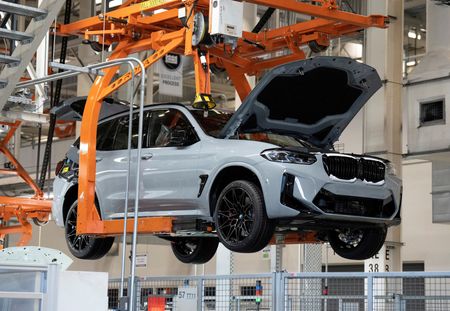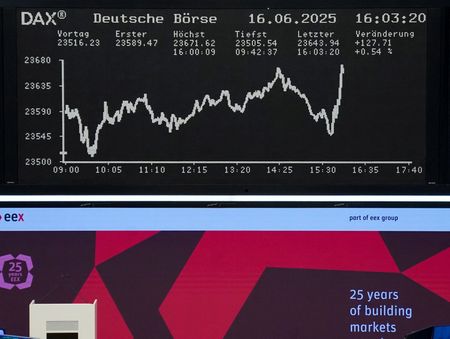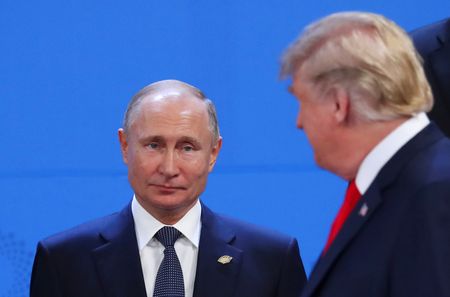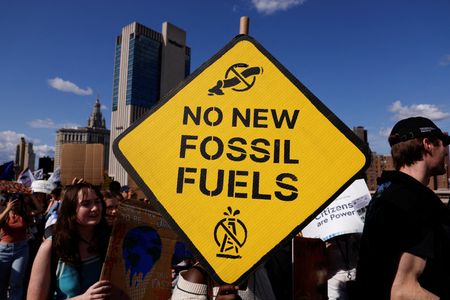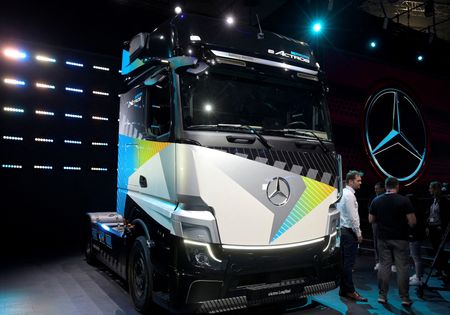(Reuters) -Brussels is considering pursuing a potential arrangement that would allow European automakers that produce and export cars from the United States to import vehicles from the EU at reduced tariff rates, according to two sources familiar with the matter.
The discussion is part of the European Commission’s efforts to broker a trade deal with U.S. President Donald Trump and would replace the hefty 25% tariff on car and car part imports the U.S. administration implemented in April.
This would be a clear positive for those carmakers with major U.S. production facilities, who would be able to use their U.S. production to lower their exposure to tariffs.
This is what a trade deal means for the EU and how individual European automakers would be affected:
WHAT’S AT STAKE FOR EU?
According to data from European auto association ACEA, nearly 758,000 cars worth 38.9 billion euros ($45.55 billion) were exported to the U.S. from Europe in 2024, more than four times as many as in the other direction.
One EU diplomat said cars were a “red line” for the bloc, making a concession on cars a caveat of any deal. However, Brussels and Washington have conflicting goals as Trump wants to revive U.S. auto production while Brussels wants open markets for its sector, which is struggling with high energy costs and competition from China.
WHO STANDS TO WIN?
Germany’s BMW and Mercedes-Benz would benefit most from a mechanism counting U.S. exports against imports from the EU, as both companies operate large factories in the United States.
BMW, for example, exported around 225,000 vehicles produced at its Spartanburg, South Carolina, plant in 2024, while it sold around 400,000 autos in the U.S. market. It imported around 175,000 autos from other markets, less than what it exported.
Mercedes-Benz exports around two thirds of the vehicles it makes at its plant in Tuscaloosa, Alabama, or around 170,000 based on 2024 production.
It sold around 324,528 vehicles in the United States last year and imported around 235,000 from other countries.
WHO WOULD BE THE LOSERS?
Volkswagen, Europe’s biggest carmaker, would not benefit, as it mostly sells cars produced at its Chattanooga, Tennessee, plant locally rather than exporting them.
An industry source said for that reason, there has also been a push to get Washington to agree to investment credits, which would support foreign automakers’ plans to expand to boost local production.
Volkswagen, for example, is currently deciding whether to localise production of its Audi brand – which imports all of its cars into the U.S. market – either via a new factory or expanding existing sites.
Porsche would also see no benefit: it has no local production and imports all of its cars from Europe.
LITTLE IMPACT FOR STELLANTIS
Stellantis, the world’s No. 4 automaker, owner of brands including Jeep, Ram and Chrysler, would not be seriously affected by such an arrangement.
Stellantis operates a number of U.S. plants, mostly serving the local market, while import and export flows of its cars between the U.S. and the European Union have historically been very low – typically small volumes of U.S.-made trucks versus European-made models from the Alfa Romeo, Maserati and Fiat brands.
The group is far more vulnerable to any U.S. tariffs on Mexico and Canada, as it manufactures around 40% of its North American vehicles in those two countries, particularly in Mexico.
CLEAR LOSS FOR VOLVO CARS
Volvo Cars is one of the most exposed European automakers to U.S. tariffs, as most of the cars it sells there are imported from Europe. The U.S. accounted for 16% of group sales last year.
The company has said it will expand production at its Charleston, South Carolina factory, adding a new model alongside the electric EX90 that is currently made there.
Volvo has said the new vehicle would most likely be a plug-in hybrid mid-sized SUV, a popular option with U.S. consumers.
Last year Polestar, which like Volvo Cars is part of China’s Geely group, started producing the Polestar 3 SUV at the Charleston plant to avoid hefty U.S. tariffs on Chinese-made cars.
($1 = 0.8540 euros)
(Reporting by Christoph Steitz in Frankfurt, Giulio Piovaccari in Milan and Nick Carey in London; Editing by Susan Fenton)

